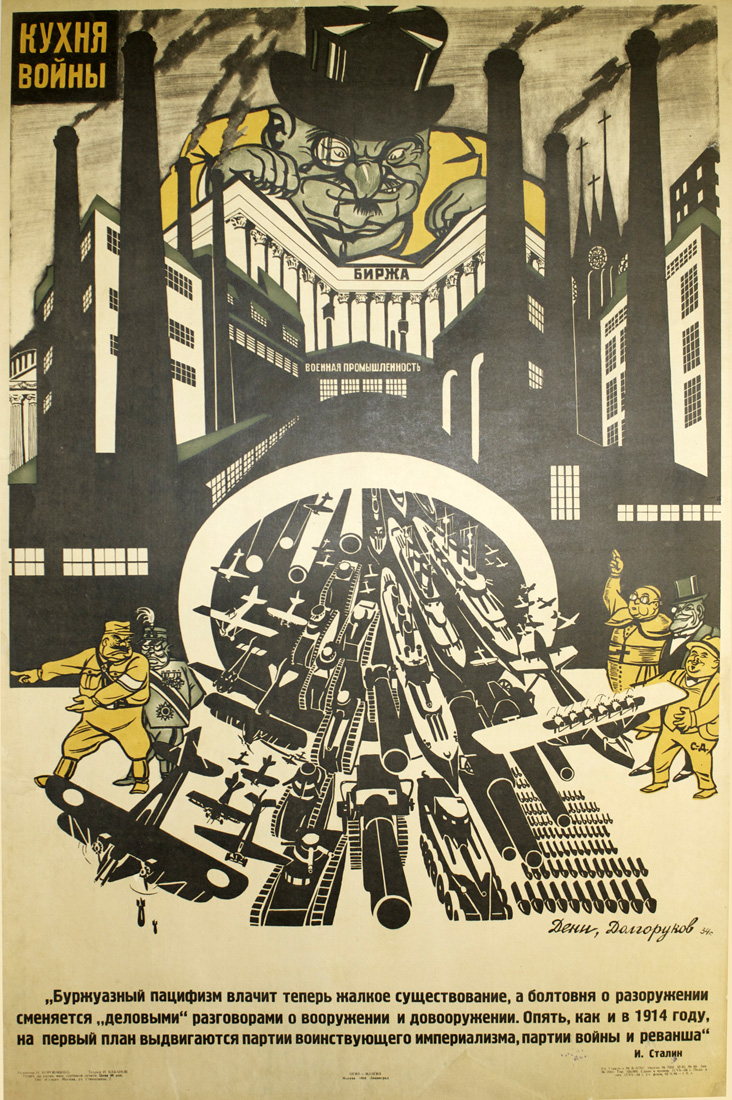
Cooking up for War "Bourgeois pacifism is teetering and bankrupt, and its muttering about disarmament is changing into weapons business negotiations for armaments and additional armaments. Again, as in 1914, the parties of war and revenge are moving into the first position." -- Stalin
Poster Number: PP 293
Category: Communist Culture
Media Size: 41.5x28
Poster Type: Lithograph
Publishing Date: 1934
Editorial Information: Editor N. Korobchenko; Technical Editor I. Kabanov
Technical Information on Poster: Izogiz No. 7002. I-35; No. 68; Order No. 2961; Submitted for production June 11, 1934; Approved for printing June 17, 1934; Standard format 62 x 94 - 1 sheet of paper; Price __kopeks; Printed on an offset rotary press.
Print Run: 150,000
Glavlit Directory Number: B-37767
Catalog Notes: PP 293 Communist Culture b
Artist: Deni (Denisov), Viktor Nikolaevich — Дени (Денисов), Виктор Николаевич
Although known for his characterizations and posters that he signed with the pseudonym 'Deni'; Viktor Nikolayevich Denisov never received formal artistic education. Around 1906, Deni began exhibiting at the annual exhibitions of the Society of Independents in Saint Petersburg, as well as at the Salon of Humorists. In 1910, he took private lessons in painting and drawing from the artist-portraitist Nikolai P. Ulianov and that same year, he became active in the field of political caricature, contributing ...
Read More About This Artist
Artist: Dolgorukov, Nikolai Andreevich — Долгоруков, Николай Андреевич
In 1928, Nikolai Andreevich Dolgorukov moved from his native Ekaterinburg to Moscow to attend VKhUTEIN (Higher State Artistic and Technical Institute). After that organization dissolved in 1930, Dolgorukov continued his studies at the Moscow Polygraphic Institute under the tutelage of artists Lev Bruni and Dimitri Moor. Dolgorukov's training was in illustrated political satire as well as in poster design, and each area became the main focus of his long career. After graduation, he collaborated with fellow poster ...
Read More About This Artist
Printer: Gudok Typography Workshop, Moscow — Типография Гудок, Москва
Gudok is the Russian word for whistle and it was also the name given to the railway industry newspaper in the Soviet Union. The newspaper's printing workshop was in Moscow at 7 Stankevich Street (formerly Voznesenskii Lane), a street named after Alexander Stankevich (1821-1912), the Russian writer, biographer and publisher. From the end of the nineteenth century until 1918, the location served as the printing house and editorial offices of the liberal newspaper "Russian News" (...
Read More About This Printer
Publisher: Ogiz-IzoGiz, Moscow — Огиз-Изогиз, Москва
Ogiz was the Association of the State Book and Magazine Publishers. Its main offices were located in Moscow and in Leningrad. The Sovnarkom of the Russian Socialist Federative Soviet Republic established Ogiz in 1930 to centralize publishing activities under a state monopoly in order to eliminate duplication of printed material, streamline and control publishing production and output, and to create a base for marketing books, training and technical manuals. In 1931, the Central Committee of the USSR ...
Read More About This Publisher